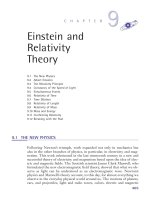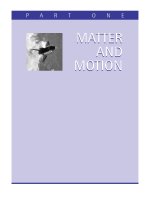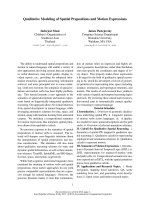forces and motion
Bạn đang xem bản rút gọn của tài liệu. Xem và tải ngay bản đầy đủ của tài liệu tại đây (6.61 MB, 12 trang )
Genre Comprehension Skill Text Features Science Content
Nonfi ction Cause and Effect • Captions
• Glossary
Forces and Motion
Scott Foresman Science 2.1
Standards
Preview
Standard Set 1. Physical Sciences
1. The motion of objects can be
observed and measured. As a basis for
understanding this concept:
1.a. Students know the position of an
object can be described by locating it
in relation to another object or to the
background.
1.b. Students know an object’s
motion can be described by recording
the change in position of the object
over time.
1.c. Students know the way to change
how something is moving is by giving
it a puash or a pull. The size of the
change is related to the strength, or the
amount of force, of the push or pull.
1.d. Students know tools and machines
are used to apply pushes and pulls
(forces) to make things move.
1.e. Students know objects fall to the
ground unless something holds them up.
1.f. Students know magnets can be
used to make some objects move
without being touched.
ISBN 0-328-23493-1
ì<(sk$m)=cdejdg< +^-Ä-U-Ä-U
23493_CVR.indd Cover123493_CVR.indd Cover1 2/1/06 1:34:59 PM2/1/06 1:34:59 PM
Physical Sciences
by Mary Beth Spann
23493_CVR.indd Cover223493_CVR.indd Cover2 2/1/06 1:35:07 PM2/1/06 1:35:07 PM
Vocabulary
attract
force
friction
gravity
motion
repel
Picture Credits
Every effort has been made to secure permission and provide appropriate credit for photographic material. The
publisher deeply regrets any omission and pledges to correct errors called to its attention in subsequent editions.
Unless otherwise acknowledged, all photographs are the copyright © of Dorling Kindersley, a division of Pearson.
Photo locators denoted as follows: Top (T), Center (C), Bottom (B), Left (L), Right (R), Background (Bkgd).
Opener: ©Michael Dunning/Getty Images; 8 ©AFP/Getty Images; 9 ©Chapman/NewSport/Corbis; 11 ©Mike Brinson/
Getty Images; 12 ©Nation Wong/Corbis.
ISBN: 0-328-23493-1
Copyright © Pearson Education, Inc. All Rights Reserved. Printed in the United States of America.
This publication is protected by Copyright, and permission should be obtained from the publisher prior to any
prohibited reproduction, storage in a retrieval system, or transmission in any form by any means, electronic,
mechanical, photocopying, recording, or likewise. For information regarding permission(s), write to
Permissions Department, Scott Foresman, 1900 East Lake Avenue, Glenview, Illinois 60025.
1 2 3 4 5 6 7 8 9 10 V010 13 12 11 10 09 08 07 06
23493_CVR.indd Cover323493_CVR.indd Cover3 1/6/06 5:00:11 PM1/6/06 5:00:11 PM
by Mary Beth Spann
23493_001-020.indd 123493_001-020.indd 1 1/6/06 9:57:30 AM1/6/06 9:57:30 AM
How can you
describe position?
Look at the picture.
The boys are in front of the goal.
The bushes are behind the goal.
In front of and behind tell position.
Position tells where something is.
The coach is to the
right of the goal.
2
23493_001-020.indd 223493_001-020.indd 2 1/6/06 9:57:34 AM1/6/06 9:57:34 AM
You can also use the background to
describe position.
There are bushes in the background.
The goal is in front of the bushes.
We measure to fi nd distance.
We use centimeters and meters.
The ball and the goal are about 5
meters apart.
What else can you measure
on the soccer fi eld?
3
23493_001-020.indd 323493_001-020.indd 3 1/6/06 9:57:40 AM1/6/06 9:57:40 AM
4
What is motion?
Motion is the act of moving.
Things move in different ways.
Some things move in straight lines.
Some things move back and forth.
Some things move around and around.
The car and the bicycle
are in motion.
23493_001-020.indd 423493_001-020.indd 4 1/6/06 9:57:42 AM1/6/06 9:57:42 AM
Motion has speed and direction.
Push your bicycle pedals to change
speed.
Turn the handlebars to change direction.
The bicycle moved for 10 minutes.
The car moved for 10 minutes.
The car moved farther than the bicycle.
Is the car or bicycle farther
from the library?
5
23493_001-020.indd 523493_001-020.indd 5 1/6/06 9:57:48 AM1/6/06 9:57:48 AM
6
Measuring Motion
You can fi nd out how far something
moves.
How can you do that?
You can measure.
You can measure how far the truck goes.
23493_001-020.indd 623493_001-020.indd 6 1/6/06 9:57:51 AM1/6/06 9:57:51 AM
7
Roll a toy truck down a ramp.
Mark where it stops.
Now make the ramp a little higher.
Roll the truck down again.
Mark where it stops.
How far did the truck go each time?
23493_001-020.indd 723493_001-020.indd 7 1/6/06 9:57:53 AM1/6/06 9:57:53 AM
8
Force
Force is a push or a
pull that can make
something move.
Force changes an
object’s speed and
direction.
An object needs a push
or a pull to move.
Objects can speed up
with a push or a pull.
Or they can slow down.
Tapping a ball
takes little force.
23493_001-020.indd 823493_001-020.indd 8 1/6/06 9:57:53 AM1/6/06 9:57:53 AM
9
It takes more force to
move something farther.
Tapping a ball moves it
a little bit.
Kicking the ball moves
it farther.
Heavier things need
more force to be moved.
Kicking a ball
takes more force.
23493_001-020.indd 923493_001-020.indd 9 1/6/06 9:58:03 AM1/6/06 9:58:03 AM
10
What is friction?
What slows down a kicked ball?
What makes it stop?
Friction slows and stops things.
Friction slows the ball.
Friction makes the ball stop.
23493_001-020.indd 1023493_001-020.indd 10 1/6/06 9:58:07 AM1/6/06 9:58:07 AM
11
A bicycle moves faster on a smooth road.
It moves slower on bumpy grass.
Friction between the tires and grass
slows the tires.
There is more friction when you
ride your bicycle over grass.
23493_001-020.indd 1123493_001-020.indd 11 1/6/06 9:58:11 AM1/6/06 9:58:11 AM
12
How can tools and
machines make
things move?
Tools and machines help us do jobs.
Tool and machines can push, pull, and
move things.
A hammer is a tool.
It can help push a nail into wood.
The hammer
uses force to
push the nail.
23493_001-020.indd 1223493_001-020.indd 12 1/6/06 9:58:14 AM1/6/06 9:58:14 AM
13
Using Tools and Machines
The wagon is a machine.
Wagons can move heavy things.
They can move many things at once.
A wagon can help you
move many toys at once.
23493_001-020.indd 1323493_001-020.indd 13 1/6/06 9:58:17 AM1/6/06 9:58:17 AM
14
What is gravity?
Why do things fall back to Earth?
Gravity pulls things down.
Gravity pulls things toward Earth’s
center.
The pull of
gravity makes
this car fall.
23493_001-020.indd 1423493_001-020.indd 14 1/6/06 9:58:18 AM1/6/06 9:58:18 AM
15
Gravity pulls harder on heavy things.
A car is heavier than a ball.
Gravity pulls harder on a car than on
the ball.
Gravity keeps the
bear on the table.
It keeps the table
on the ground.
23493_001-020.indd 1523493_001-020.indd 15 1/6/06 9:58:21 AM1/6/06 9:58:21 AM
16
What are
magnets?
Magnets can push things.
They can attract things that are metal.
Attract means to pull toward.
Magnets can also repel other magnets.
Repel means to push away.
This magnet attracts
metal paper clips.
23493_001-020.indd 1623493_001-020.indd 16 1/6/06 9:58:22 AM1/6/06 9:58:22 AM
17
A magnet has two poles.
Each pole has a strong push
and pull.
Like poles repel each other.
Unlike poles attract each other.
23493_001-020.indd 1723493_001-020.indd 17 1/6/06 9:58:26 AM1/6/06 9:58:26 AM
18
How Magnets Move Objects
A magnet can move something without
touching it.
Look at the picture.
The magnet is pulling the spoon closer.
But the magnet is not touching the spoon.
Magnets can pull
things from far away.
23493_001-020.indd 1823493_001-020.indd 18 1/6/06 9:58:29 AM1/6/06 9:58:29 AM
19
Patterns Made by a Magnet
Magnets can make patterns.
See the picture?
The magnet has moved the pieces
of iron.
They have been moved in a pattern.
This pattern was
made with a magnet
and iron.
23493_001-020.indd 1923493_001-020.indd 19 1/6/06 9:58:30 AM1/6/06 9:58:30 AM
20
attract pull toward
force a push or a pull that makes
something move
friction a pull that makes a moving
object slow down or stop moving
gravity a force that pulls things toward
the center of Earth
motion the act of moving
repel push away
Glossary
23493_001-020.indd 2023493_001-020.indd 20 1/6/06 9:58:33 AM1/6/06 9:58:33 AM
What did you learn?
1. What are some of the different ways things
can move?
2. Name one tool and one machine that you
learned about.
3.
Force, friction, and
gravity are vocabulary words. Group them
into two sentences that tell how they are
related.
4. Cause and Effect What causes the tires
on a bicycle to slow down on bumpy grass?
What is the effect of this?
23493_CVR.indd Cover423493_CVR.indd Cover4 1/6/06 9:50:46 AM1/6/06 9:50:46 AM









